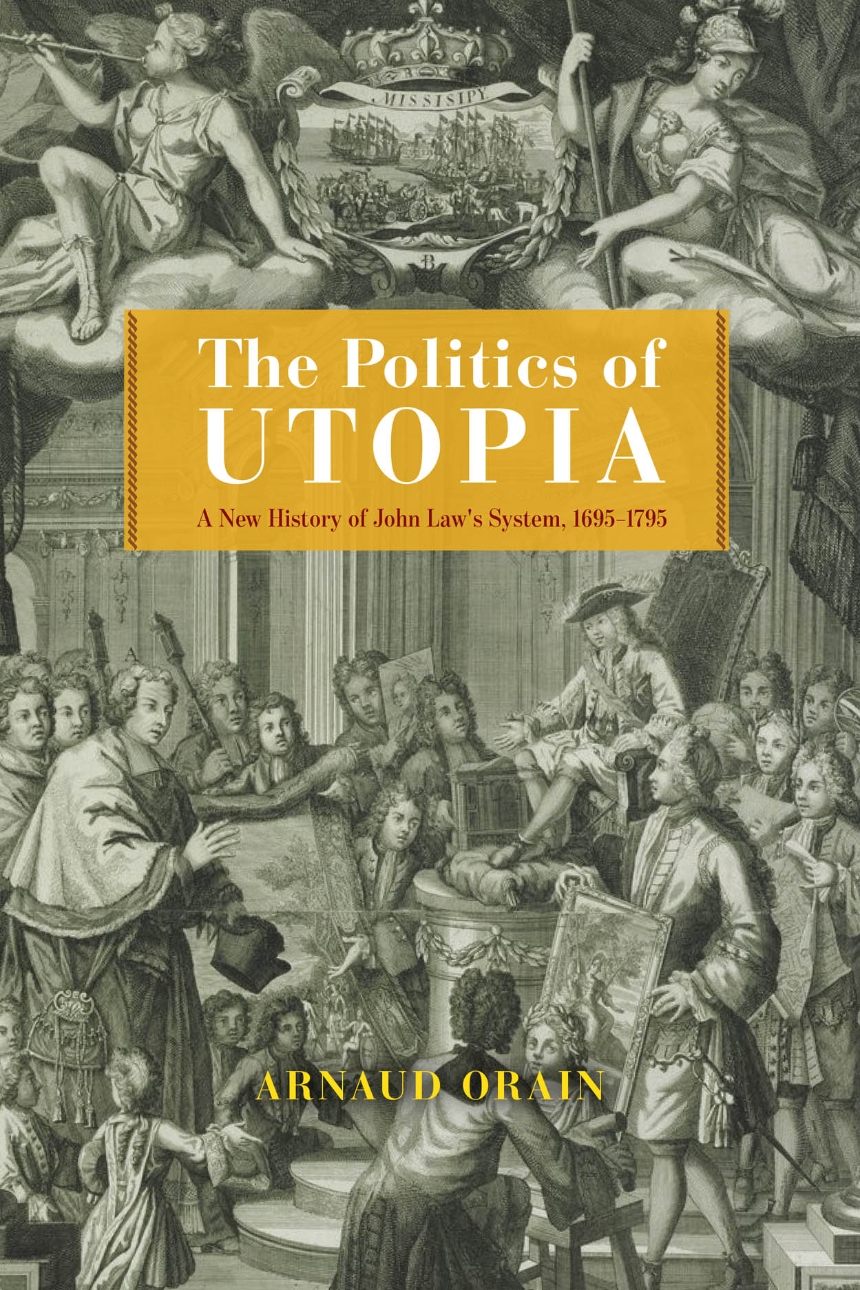The Politics of Utopia
A New History of John Law’s System, 1695–1795
The Scottish economist John Law has been described as the architect of modern central banking. His “System,” established in Regency France between 1716 and 1720, saw the founding of a bank issuing paper money and the establishment of state commercial and colonial enterprises aimed at consolidating public debt. What at first seemed like financial wizardry, however, resulted in rampant speculation and, ultimately, economic collapse. In The Politics of Utopia, historian Arnaud Orain offers a provocative rereading of this well-known episode.
Starting his story in the seventeenth century, Orain reconstructs the figures and ideas, long predating Law, that anticipated and laid the groundwork for the System, which, he argues, is best understood as a failed social utopia aimed at the total transformation of society. Overturning familiar narratives of this seismic event, this book rewrites a stunning chapter in economic history by dealing with the cultural, colonial, religious, and political dimensions of the (in)famous System up to the French Revolution, revealing new lessons for today’s fraught financial landscape.
344 pages | 12 halftones | 6 x 9 | © 2024
Economics and Business: Economics--History
History: European History, General History, History of Ideas
Reviews
Table of Contents
Excerpt
Since the end of the seventeenth century, utopians, theologians, travelers, economists, and what Daniel Defoe called projectors—individuals who promote projects or schemes that combine public benefit and private profit, meaning the English propagandists of a grand plan of the years 1710–11—had all pointed out the vice inherent in the existence of rentes (annuities) and rentiers (annuitants) and denounced competition, greed, and taxation as forms of civil war. The solutions they proposed constituted the basis of what the System—its architecture and its goals—would become. The latter was, thus, not an accident but rather the result of an intellectual dynamic that had been initiated twenty years before and that had little to do with John Law. By studying the archives dealing with North America, on the Académie des sciences and the metallurgical experiments of some of its scholars, and on the famous Enquête du régent (Survey of the regent), dedicated to mines and factories, it was obvious that the French monarchy had not waited for Law to launch scientific, colonial, and commercial programs that were then continued under the System. The same was true for Louisiana, which since the seventeenth century had represented much more than just a continent to be exploited. It had occupied the French and European imagination around repressed desires (of abundance, adventure, sexuality) for a very long time, and this fantasy both nourished the System and was nourished by it in a kind of self-perpetuating phenomenon.
Law was not alone in building and disseminating the System under the Regency, far from it. For a better understanding of the subject, I started from the very many printed or handwritten documents that justified or promoted the experiment, whatever their origin and form (treaties, letters, newspapers, stories, maps, engravings, poems, songs), and I sought to discover the links and relationships that united their authors. Art collectors, men of letters, and philosophers of the clan of the “Moderns,” cartographers and ecclesiastics, all constituted several networks busy in Paris, Versailles, and Louisiana. The largely unpublished and scattered archives on the colonial trade and the Compagnie des Indes also played an important role in understanding how the System had been deployed as a major project for controlling and directing all the productive forces of the kingdom. To this end, I examined the trade expeditions, the naval bases, the slave trade, the organization of the price system, the settlers, and the mineral exploration and its discoveries. I took the liberation of desires stated by various promoters of the experiment seriously. In the same way, I studied the (al)chemical, theological, and fabulous references, not in a metaphoric way, as they have been so far, but for their very concrete roles in the proper functioning of the System (its use of metals and the logic of expenditure).
Concerning the anti-System literature and imagery, I concentrated on unknown or unpublished sources from three main origins: the trading sphere, frightened by the birth of a protodirigiste capitalism; the Jansenists, who took a stand against an experiment they considered to be sacrilegious; and songwriters and poets, who denounced a world of illusion and the shame felt by the subjects of the kingdom of France at the end of the year 1720. As for the posterity of the System, I first studied it in the vast intertextual network of the rococo fables published between 1720 and 1750 that referred to it, then in the debate over the termination of the Compagnie des Indes at the end of the 1760s, and, finally, under the French Revolution in the debate between the moderate and the radical republicans concerning private property and the demonetization of coins. In each of these cases, this book traces the echo throughout the century of the true ambition of the System. Could the freedom of individuals, their desires, and their property be sacrificed in a great jubilee from which would be born a new society regulated by an all-powerful authority?
